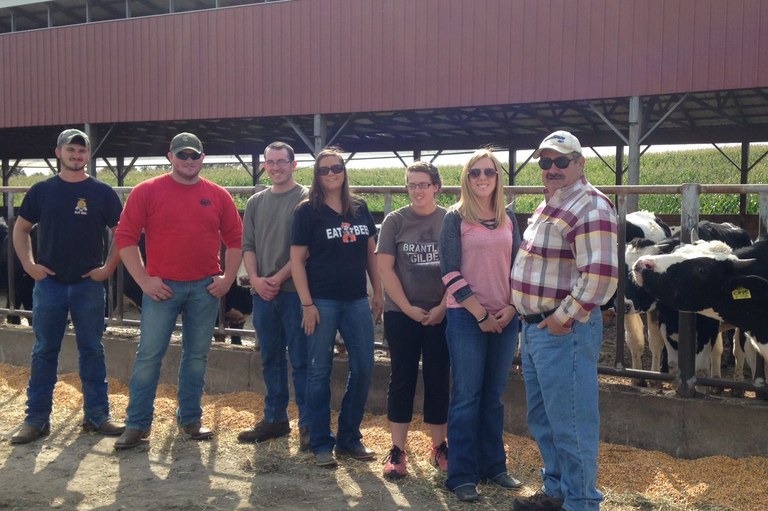Posted: October 24, 2017

Penn State Animal Science students, from left: Matt Wagner, Reuben Hicks, Ben Dreschel, Courtney Love, Toni Smith, Kayce Myers and Professor Dan Kniffen, Ph.D.
Nothing is more valuable to students than having exposure to real life operations as they pursue their academic studies in their majors. To facilitate the learning experience, Penn State Cooperative Extension in Tioga County hosted Penn State Department of Animal Science livestock students on visits to two producers in the Northern Tier of Pennsylvania this fall.
Dan Kniffen, Assistant Professor of Animal Science, said, "We are appreciative of the producers who open their operations for our students to visit and learn. It is a unique opportunity to help students better understand real operations as part of their studies of the beef industry. We find it is also helpful for producers to interact with the students, all of whom are seniors."
J. Craig Williams, Extension Educator, coordinated the visits and said, "Tioga County welcomes the opportunity to host students from Penn State. It allows our producers to interact with the University, and helps the students gain an understanding of the real challenges facing producers."
The group visited the Webster family, Hillstone Farm, Wellsboro. Five miles west of Wellsboro, this Northern Tier multi-generational family farm has been in continuous operation since 1927. Now operated by Tim Webster and his two sons Todd and Garrett and their families, the farm is a small, diverse, sustainable farm producing high quality beef, pork and pastured poultry. They produce beef for Myers Local Harvest through the Cargill Plant in Wyalusing.
Both Todd and Garrett are graduates of Penn State's College of Agricultural Sciences.
They next visited Jerry Martin who is growing and finishing beef and Holstein steers also for Myers Local Harvest. Martin has about 20 percent of his barn in Holsteins he purchases from neighboring farms as he tests the market on them; the remainder are beef finish steers. The cattle are fed a high concentrate ration from Southern States Feeds called "Tender Beef" to reduce the number of days the cattle need to be on feed.
The field trip was made possible through a grant from the Center for Beef Excellence.

